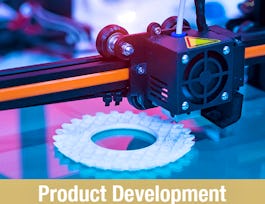Generative AI is transforming how businesses operate. According to a McKinsey survey, over 78% of organizations are implementing AI, making its impact undeniable. Netflix’s AI-driven recommendations feature is one such example. With companies leaning to develop AI-powered products, the AI product manager role is becoming increasingly critical.



Product Management: Building AI-Powered Products
This course is part of multiple programs.


Instructors: Skill-Up EdTech Team
Sponsored by Coursera Learning Team
4,850 already enrolled
(51 reviews)
Recommended experience
What you'll learn
Explain the roles of an AI product manager and the required skills to manage a product lifecycle, and explore their daily routine.
Conduct a skills analysis, examine AI opportunities and challenges, and use AI tools in product development and market reach expansion.
Describe the AI value proposition, methods for communicating with stakeholders, the AI process, stages of AI product development, and the ROI of AI.
Discuss AI integration into the product management lifecycle, AI’s impact and use cases, and strategies for commercializing AI products.
Details to know

Add to your LinkedIn profile
7 assignments
See how employees at top companies are mastering in-demand skills

Build your subject-matter expertise
- Learn new concepts from industry experts
- Gain a foundational understanding of a subject or tool
- Develop job-relevant skills with hands-on projects
- Earn a shareable career certificate


Earn a career certificate
Add this credential to your LinkedIn profile, resume, or CV
Share it on social media and in your performance review

There are 3 modules in this course
This module explains the AI product manager’s role in managing the product lifecycle by leveraging AI technologies. You will learn about the AI process, the ROI that AI brings to a project, and how a product manager balances traditional product management skills with AI-specific knowledge. You will learn how a product manager builds the AI “Dream Team” and communicates AI to stakeholders. In addition, you will look at the challenges faced by a product manager and the reasons for the failure of AI product development projects.
What's included
11 videos3 readings3 assignments1 discussion prompt9 plugins
In this module, you will learn about the stages of AI product development and the key activities in each stage. You will also learn about the seven phases of the product management lifecycle. In addition, you will get to know about AI’s impact across industries and some AI use cases where AI was used to achieve product goals and objectives. You will also learn about commercialization activities for an AI product and the current trends and future insights in AI.
What's included
8 videos2 readings3 assignments1 discussion prompt7 plugins
In this module, you will complete a final project where you will review a product concept document proposing the development of an AI-driven system that will monitor and improve traffic flow in a large city and provide a return on investment (ROI). In addition, you will attempt a final graded exam designed to evaluate your understanding of developing and delivering a product.
What's included
2 readings1 assignment2 plugins
Offered by
Why people choose Coursera for their career




Learner reviews
51 reviews
- 5 stars
75%
- 4 stars
7.69%
- 3 stars
5.76%
- 2 stars
1.92%
- 1 star
9.61%
Showing 3 of 51
Reviewed on Oct 2, 2024
Best course to learner about Product Management using AI
Reviewed on Nov 20, 2024
Excelente para poder llevar el ciclo de vida de un producto de IA
Recommended if you're interested in Information Technology

Johns Hopkins University

University of Colorado Boulder

Fractal Analytics

Advancing Women in Tech

Open new doors with Coursera Plus
Unlimited access to 10,000+ world-class courses, hands-on projects, and job-ready certificate programs - all included in your subscription
Advance your career with an online degree
Earn a degree from world-class universities - 100% online
Join over 3,400 global companies that choose Coursera for Business
Upskill your employees to excel in the digital economy


